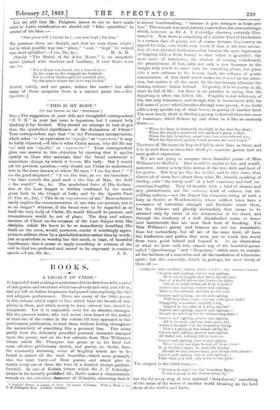" THIS IS MY BODY."
[TO THE EDITOR OF THE " SPECTATOR:1
SIR,—The suggestion of your able and thoughtful correspondent "E. V. N." in your last issue is ingenious, but I cannot help thinking it far fetched. Why should we attempt to look deeper than the symbolical significance of the declaration of Christ ? Your correspondent says that "to the Protestant interpretation, which takes is' as equivalent to 'signifies ' or represents,' it may be fairly objected,—if this is what Christ meant, why did He say 'is,' and not 'signifies' or ' represents?' " Your correspondent gives one answer to this objection by showing that it applies equally to those who maintain that the bread underwent a miraculous change by which it became His body. But I would ask the previous question,—why should not Christ be understood here in the same manner as where He says, " I am the door ;" "I am the good shepherd ;" " I am the vine, ye are the branches ;" "he that soweth the good seed is the Son of Man, the field is the world?" &c., &c. The symbolical force of His declaration at the Last Supper is further confirmed by the words given both in the Gospel of Luke and by the Apostle Paul (1. Cor. xi., 24), "This do in remembranceof me." Remembrance surely implies the commemoration of one who was present, but is so no longer? whereas, if the bread were to be regarded as in itself the very body of Christ, He would Himself be present, and remembrance would be out of place. The deep and solemn emotion of Christ on the occasion of the Last Supper with His disciples, which He knew to be so immediately heralding His death on the cross, would, moreover, render it touchingly appropriate to address them by a symbolical action rather than by words ; just as symbolism in worship has this much, at least, of beautiful significance, that it seems to imply something in relation of the soul to God too profound and sacred to be expressed in common speech.—I am, Sir, &c., .J. It.


































 Previous page
Previous page